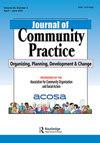Investing in community power building to increase civic engagement through voting: lessons from the Building Healthy Communities initiative
IF 1.2
Q2 SOCIAL WORK
引用次数: 1
Abstract
ABSTRACT The objective of this study was to examine the impact of investments in community organizing made as part of a 10-year comprehensive community initiative focused on community power building in California. Data from multiple sources were used to examine the relationship between investments and one measure of civic engagement, voter turnout. Comparisons were made over time (2010–2019) and between intervention and propensity-weighted comparison sites. Analyses determined that investments by the funder were positively associated with turnout; this effect differed across elections and was largest in 2012. Broad investments to support community engagement, organizing, and base building had a positive impact on voting, an important indicator of civic engagement. In historically marginalized or underserved communities, investing in power building can yield benefits despite structural barriers that result in inequities. As restrictive electoral reforms grow across the country in the wake of the 2020 election, initiatives designed to build power may support proactively organizing against these changes or provide the infrastructure to understand and navigate them. Investing in community power building is a promising strategy for philanthropic organizations, organizers, and policy makers.投资于社区权力建设,通过投票增加公民参与:建设健康社区倡议的经验教训
摘要:本研究的目的是考察社区组织投资的影响,这是加州一项为期10年的社区综合倡议的一部分,重点是社区权力建设。来自多个来源的数据被用来检验投资与公民参与的一个衡量标准——选民投票率之间的关系。在一段时间内(2010-2019年)进行比较,并在干预和倾向加权比较地点之间进行比较。分析表明,资助者的投资与投票率呈正相关;这种影响在不同的选举中有所不同,在2012年最为明显。支持社区参与、组织和基础建设的广泛投资对投票产生了积极影响,投票是公民参与的一个重要指标。在历史上被边缘化或服务不足的社区,尽管存在导致不平等的结构性障碍,但投资于电力建设可以产生效益。在2020年大选之后,随着限制性选举改革在全国范围内的发展,旨在建立权力的举措可能会支持积极组织反对这些变化,或者提供理解和驾驭这些变化的基础设施。对慈善组织、组织者和政策制定者来说,投资社区力量建设是一个很有前途的策略。
本文章由计算机程序翻译,如有差异,请以英文原文为准。
求助全文
约1分钟内获得全文
求助全文
来源期刊

Journal of Community Practice
SOCIAL WORK-
CiteScore
2.40
自引率
18.20%
发文量
27
期刊介绍:
The Journal of Community Practice is an interdisciplinary journal grounded in social work. It is designed to provide a forum for community practice, including community organizing, planning, social administration, organizational development, community development, and social change. The journal contributes to the advancement of knowledge related to numerous disciplines, including social work and the social sciences, urban planning, social and economic development, community organizing, policy analysis, urban and rural sociology, community health, public administration, and nonprofit management. As a forum for authors and a resource for readers, this journal makes an invaluable contribution to the community"s conceptualization, applications, and practice.
 求助内容:
求助内容: 应助结果提醒方式:
应助结果提醒方式:


